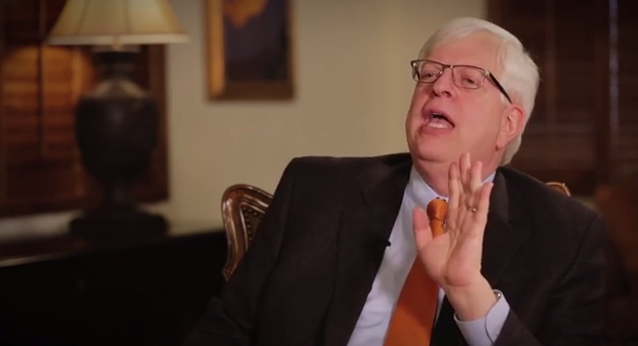
Nationally syndicated columnist and National Review Online (NRO) contributor Dennis Prager declared that the “radical and extreme” notion of marriage equality leaves “no plausible argument” against polygamy or marriages between brothers and sisters or parents and children.
In his February 18 syndicated column, Prager assailed a spate of recent judicial decisions opposing state bans on same-sex marriage or, in the case of Kentucky, calling on state officials to recognize same-sex unions performed in other states.
Challenging the court rulings, Prager cited the margins by which state voters have approved bans on marriage equality - a standard by which bans on interracial marriage would also have been valid; in 1958, 94 percent of Americans opposed such unions. But Prager assured readers that same-sex and interracial unions are in no ways analogous (emphasis added):
For [marriage equality supporters], it is identical to ruling that laws that banned interracial marriages were unconstitutional. But that argument is utterly flawed. First, the analogy is false because there is no difference between black people and white people, while there are enormous differences between males and females.Second, no great moral tradition or thinking ever forbade interracial marriages (inter-religious marriages were sometimes forbidden). Moses, for example, married a black woman, and neither the Bible nor God hinted that it was wrong.
In other words: God made Adam and Eve, not Adam and Steve. And because gay people have been historically disenfranchised, there's no reason to start granting them equal rights.
Prager proceeded to predict the consequences of allowing marriage equality to take root (emphasis added):
Proponents of same-sex marriage regularly label opponents “radical” and “extremist.” However, given that no society in thousands of years has allowed same-sex marriage, it is, by definition, the proponents of same-sex marriage whose position is radical and extreme. You cannot re-define marriage in a more radical way than allowing members of the same sex to marry. You can argue that is the moral thing to do. But you cannot argue that is it not radical.
[...]
This is another example of the lack of serious thought -- as opposed to serious passion -- that underlies the movement to redefine marriage. If American society has [in the words of Judge Vaughn Walker, who ruled against California's Proposition 8] a “constitutional obligation to provide marriages on an equal basis,” then there is no plausible argument for denying polygamous relationships, or brothers and sisters, or parents and adult children, the right to marry.
Prager's prediction dovetails with those of other marriage equality opponents who similarly suggest that necrophilia and bestiality might become commonly accepted practices if gay couples are allowed to marry. But in the 10 years since Massachusetts became the first state to legalize marriage equality, there hasn't been a rush to legalize polygamous unions. Meanwhile, most states that allow incestuous marriages are right-leaning states where same-sex marriage currently isn't allowed.
As Slate's Dahlia Lithwick has observed, the problem with “slippery slope” arguments of the kind advanced by Prager is that they ignore the deep differences between allowing a committed, loving same-sex couple to get married and permitting, say, a brother and sister to get married. Incestuous relationships, Lithwick notes, are often exploitative and psychologically destructive, with severe consequences for children's health.
Of course, expecting Prager to offer a fact-based take on marriage equality and its consequences is a fool's errand. He's made a name for himself offering hyperbolic anti-equality arguments, likening the Supreme Court's marriage equality decisions this summer to Egypt's military coup and denouncing anti-discrimination laws as harbingers of “fascism.”